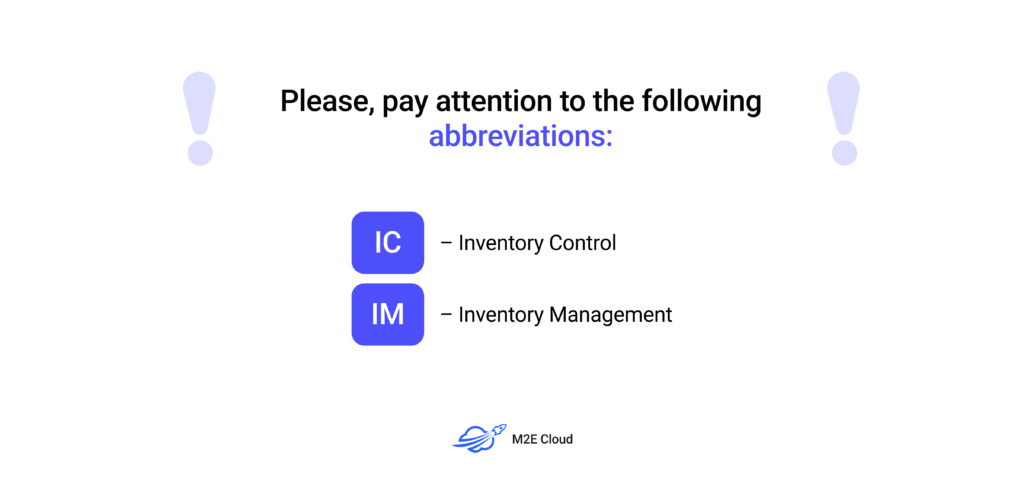In today’s hectic business reality, inventory control is often underestimated, with many merchants still neglecting its role in managing and organizing their orders. However, those who get the true importance of maintaining inventory control, especially on such competitive marketplaces as Amazon, eBay, Walmart, Salesforce, etc., and wield it effectively emerge as winners in this competitive game.
In this article, we will explore inventory control’s significance for business success and its various benefits.

What’s Inventory Control?
Inventory control (hereinafter – IC) is a pivotal aspect of a comprehensive inventory management system. Its primary goal is to ensure that your company maintains an optimal level of goods at all times. When executed strategically, effective IC can yield various benefits, such as cost reduction, mitigating out-of-stock situations, and enhancing customer contentment.
At its core, IC encompasses the entire lifecycle of your items, including procurement, warehousing, and optimizing profitability. While the terms “inventory control” and “inventory management” might seem interchangeable, the latter has a broader scope. Inventory management (hereinafter – IM) not only involves overseeing physical goods but also entails the development of robust strategies to efficiently handle these products, plan for future demand, and exercise thorough control over stock levels.
4 Reasons Why It’s Important
- Quality Control
Effective IC is essential for gaining key info about the quality of your goods. One crucial aspect to consider is the impact of storage duration on product integrity. The longer your items are held in the warehouse, the higher the risk of their potential damage. To mitigate this risk, take into account implementing a system where items are constantly rotated.
Furthermore, IC assumes an indispensable role in assessing the quality of products received from suppliers. To ensure top-notch quality, pay close attention to the following aspects during the procurement process:
- How often do you return particular items?
- How many of the products you receive are damaged?
- Are there any recurring patterns of defects or issues with specific product batches from suppliers?
- How does the quality of products received from different suppliers compare?
- Avoiding Stockouts
Maintaining an adequate stock level is critical for businesses to avoid stockouts, which can result in dissatisfied customers, missed sales opportunities, and potential harm to the company’s reputation. For instance, let’s consider a retail store specializing in electronic gadgets. During the holiday season, customer demand typically surges as people buy gifts for their loved ones. If the store doesn’t manage its products effectively, it risks running out of popular gadgets, causing stockouts.
To prevent such situations, the store can employ various strategies, such as demand forecasting, inventory tracking, and collaborating closely with suppliers.
- Cost Control
IC can have a significant impact on the control of your expenses. If done correctly, it can help you minimize carrying costs associated with excess goods, reducing storage, handling, and obsolescence expenses.
To improve your cost control, consider utilizing IM software such as Sales Channels by M2E Cloud. With Sales Channels, you can manage your inventory effortlessly across multiple marketplaces such as Amazon, eBay, Walmart, Bigcommerce, and Shopify. Moreover, the app allows you to automate stock updates, maintain optimal stock levels, optimize warehouse management, and more.
Use Sales Channels by M2E Cloud and simplify your IM process.
- Customer Needs Satisfaction
Customer needs satisfaction is the ultimate goal for any business, and effective IC directly contributes to achieving this objective. When you manage your products well, it can consistently meet your customers’ demands and expectations.
Here are some ways IC leads to your customer contentment:
- Faster Order Fulfillment: By having real-time visibility of your stock levels, you can quickly identify available wares and fulfill your customer orders promptly.
- Reduced Backorders: Implementing IM practices reduces the likelihood of backorders, where a product is out of stock but can be ordered.
- Accurate Product Information: Proper IC ensures that product information, such as availability and shipping times, is accurate and up-to-date.

Tips for Getting Started With IC
Understand Your Needs
Before diving into IC, take the time to understand your business’s needs thoroughly. Analyze your sales data, seasonality, and historical trends to identify which products are in high demand and which ones move slower. This understanding will help you determine optimal stock levels for each item, ensuring you have enough inventory to meet customer demand without holding excessive stock that ties up capital.
Implement a Reliable IM System
Invest in a reliable IM system to keep track of your stock levels, sales, and reorder points. A good IM system will help you stay organized, prevent stockouts, and avoid overstocking. It can also automate certain tasks, such as generating purchase orders when inventory levels reach a specific threshold, streamlining your operations, and saving time.
Conduct Regular Audits and Reviews
Conduct regular product audits to ensure the accuracy of your inventory records. Physical counts should be compared against the data in your IM system to identify discrepancies and rectify any issues. Additionally, periodically review your inventory turnover ratio, carrying costs, and obsolete stock to optimize your IC strategy continually. Regular evaluations will enable you to make data-driven decisions, identify areas for improvement, and maintain an efficient IM process.
Wrapping It Up
As evident, efficient IC plays a key role in the success of your online business. When executed correctly, it can yield numerous benefits, including preventing out-of-stock situations, optimizing expenses, maintaining the quality of your products, and elevating customer contentment.
To make your IC efficient, it is imperative to start by understanding your inventory requirements. This involves analyzing your sales data, seasonal trends (by the way, our M2E Analytics tool can help you with that), and customer demand patterns. Plus, consider implementing reliable IM software such as Sales Channels by M2E Cloud. This tool can automate various aspects of inventory tracking, order fulfillment, and stock replenishment, saving you time and reducing the likelihood of human errors. Furthermore, conducting regular audits is essential to maintain accuracy and integrity in your inventory records.

